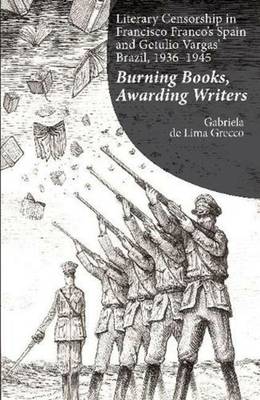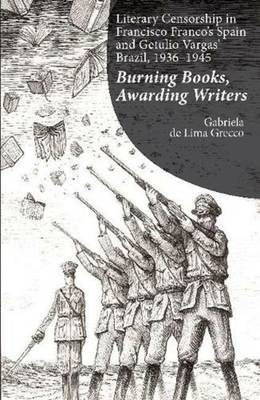
- Retrait gratuit dans votre magasin Club
- 7.000.000 titres dans notre catalogue
- Payer en toute sécurité
- Toujours un magasin près de chez vous
- Retrait gratuit dans votre magasin Club
- 7.000.0000 titres dans notre catalogue
- Payer en toute sécurité
- Toujours un magasin près de chez vous
Literary Censorship in Francisco Franco's Spain and Getulio Vargas' Brazil, 1936-1945
Burning Books, Awarding Writers
Gabriela de Lima Grecco
132,95 €
+ 265 points
Description
This book presents two systems of censorship and literary promotion, revealing how literature can be molded to support authoritarian regimes. The issue is complex in that at a descriptive level the strategies and methods new states use to control communication through the written word can be judged by how and when formal decrees were issued, and how publishing media, whether in the form of publishing companies or at the individual level, engaged with political overseers. But equally, literature was a means of resistance against an authoritarian regime, not only for writers but for readers as well. From the point of view of historical memory and intellectual history, stories of people without history and the production of their texts through the literary underground can be constructed from subsequent testimony: from books sold in secret, to the writings of women in jail, to books that were written but never published or distributed in any way, and to myriad compelling circumstances resulting from living under fascist authority. A parallel study on two fascist movements provides a unique viewpoint at literary, social and political levels. Comparative analysis of literary censorship/literary reward allows an understanding of the balance between dictatorship, official policy, and what literary acts were deemed acceptable. The regime need to control its population is revealed in the ways that a particular type of literature was encouraged; in the engagement of propoganda promotion; and in the setting up of institutions to gain international acceptance of the regime. The work is an important contribution to the history of twentieth-century authoritarianism and the development fascist ideas.
Spécifications
Parties prenantes
- Auteur(s) :
- Editeur:
Contenu
- Nombre de pages :
- 272
- Langue:
- Anglais
- Collection :
Caractéristiques
- EAN:
- 9781845199975
- Date de parution :
- 14-04-20
- Format:
- Livre relié
- Format numérique:
- Genaaid
- Dimensions :
- 157 mm x 218 mm
- Poids :
- 430 g

Les avis
Nous publions uniquement les avis qui respectent les conditions requises. Consultez nos conditions pour les avis.






